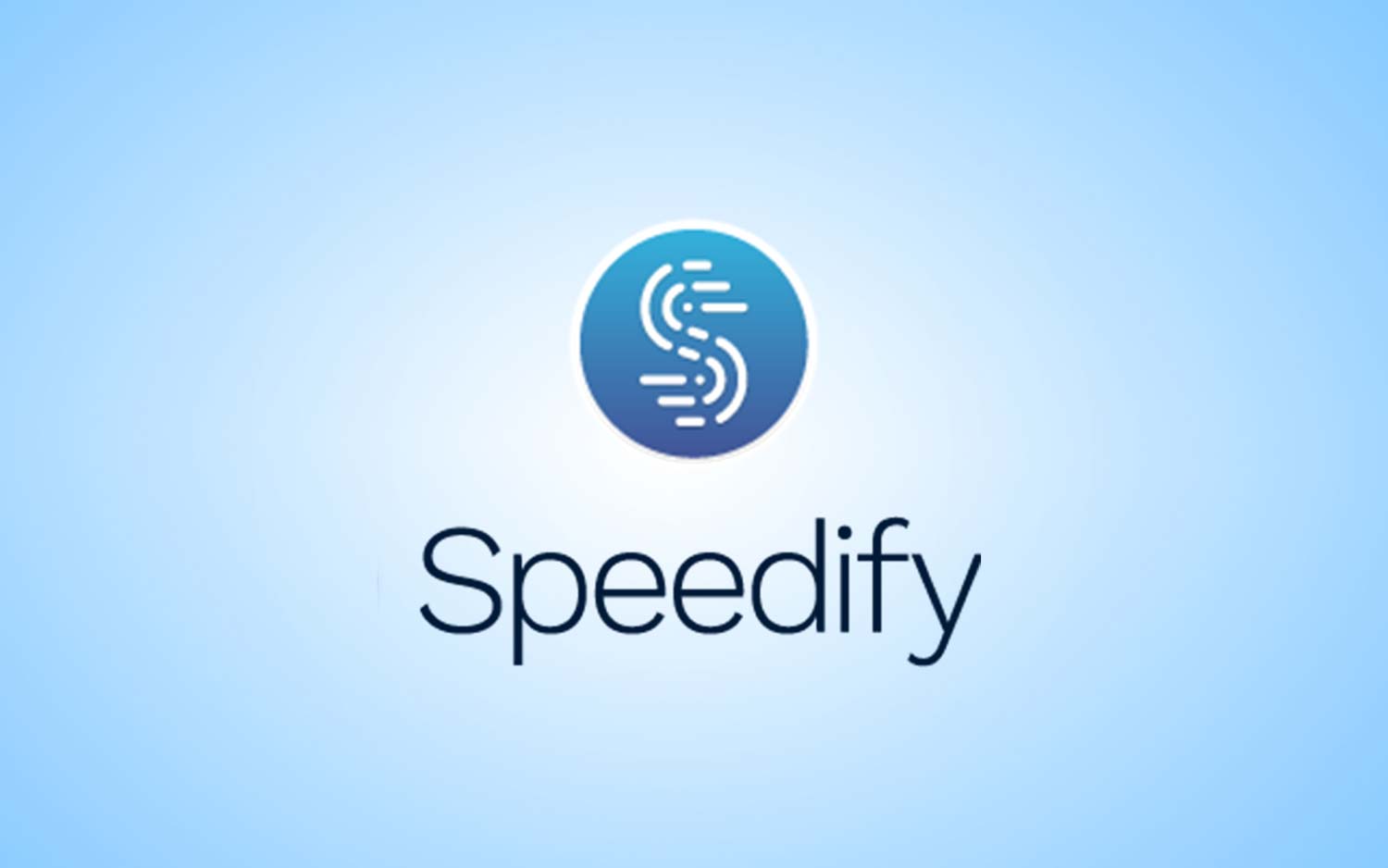Tom's Guide Verdict
Speedify is amazingly fast, but gives you only 5GB of free monthly data.
Pros
- +
Bonds Wi-Fi, LTE and Ethernet connections
- +
Very fast when it works
- +
Good geographic range
Cons
- -
US-based
- -
Needs at least two different internet connections
Why you can trust Tom's Guide
[Updated April 5, 2019 with addition of Custom DNS service. This review was originally published June 20, 2018.]
Speedify is not your typical VPN service. It was launched in 2014 as a channel-bonding service. That is, it combined the bandwidth provided by all of a device's available Wi-Fi, cellular and wired connections to dramatically boost download and upload speeds.
Two years later, Speedify added encryption, turning the service into a VPN provider as well. In mid-2018, Speedify raised its free data tier, one only 1GB per month, to 5GB monthly. For even more data, try Windscribe's 10GB monthly free plan or Hotspot Shield's 15GB plan.
Beware Entirely Free Services
We don't usually recommend using any completely free VPN, as too many of them borrow your bandwidth, inject ads into websites or sell your browsing history. They've got no incentive to keep your private data private.
It's better to stick to the free tiers offered as teasers by the paid VPN services. Some of them are quite generous, and you'll at least know how the service makes money. The drawbacks are that they often have data caps or speed restrictions.
Because of those, we can't recommend any free tier for use as a 24/7 home VPN provider; it's better to just pay for something fast and unlimited like Private Internet Access or Windscribe.
What You Get for Free
Speedify is available for iOS, Android, Windows and macOS. There aren't any options for Linux, Windows Phone or routers.
The unlimited version of Speedify costs $8.99 a month or $49.99 per year, which is competitive with even the cheapest paid VPN services. Those wary of U.S. law enforcement should know that Speedify is based in Philadelphia.
Speedify operates more than 1,000 servers in 28 countries, and free as well as paying customers can access any of them. You can pick the location you want to connect to or let the software do it for you. As of March 2019, you can also choose among AdGuard, Cloudflare, Google and OpenDNS public DNS servers.
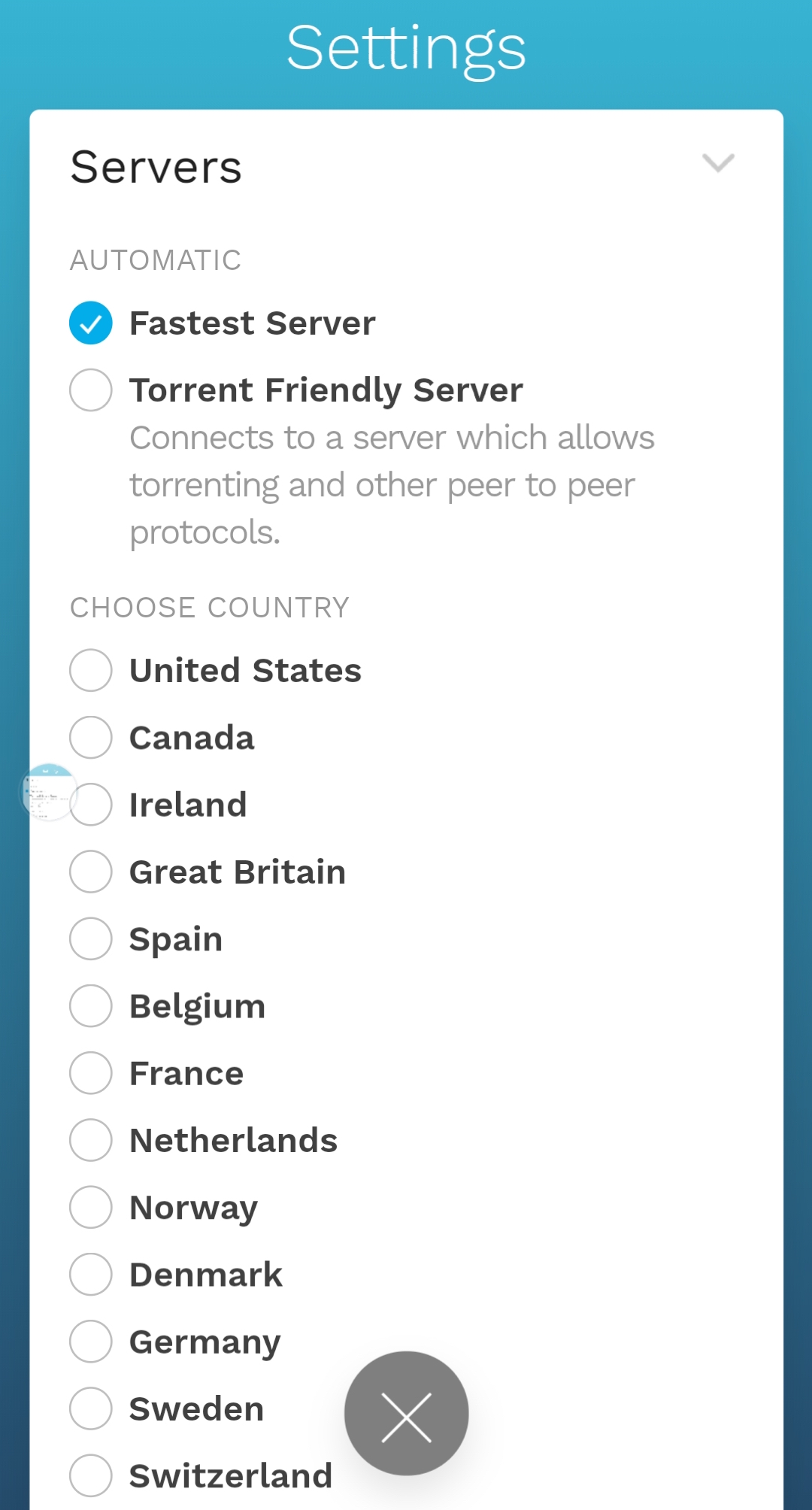
You can also adjust the priority between the Wi-Fi and the mobile-data sources. Speedify uses parallel TLS transport and protects its data flow with 256-bit ChaCha encryption, which should be more than secure enough. If a device has AES hardware encryption engines built in, such as a newer iPhone, Speedify uses that instead.
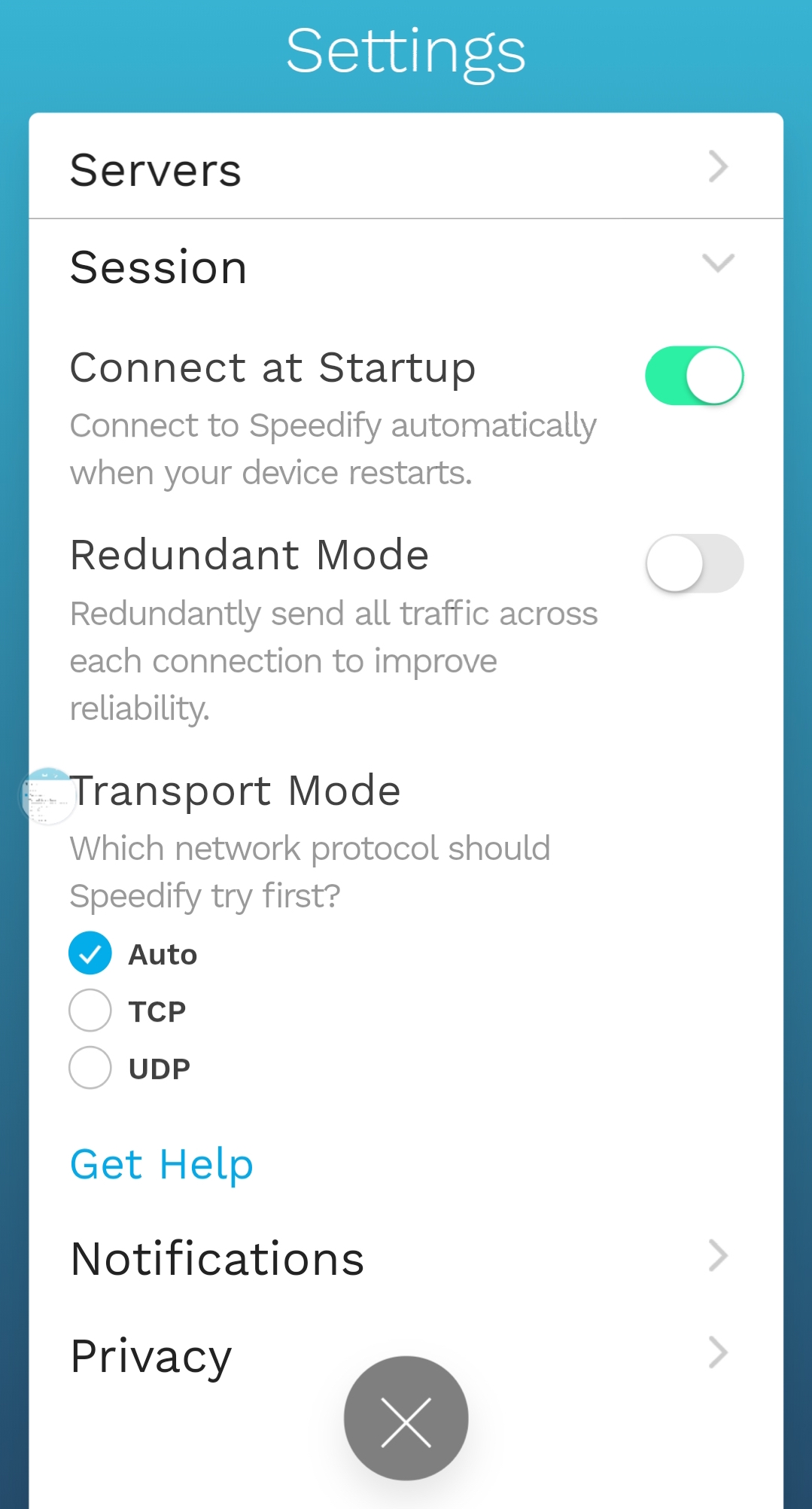
The Speedify interface is among the best. It took up our phone's whole screen and prominently showed the data sources (the phone's T-Mobile account and the local Wi-Fi network) as well as how much data had been used and the Speedify VPN server to which we were connected. There was also a bar graph showing data flow and a way to test the current speed.
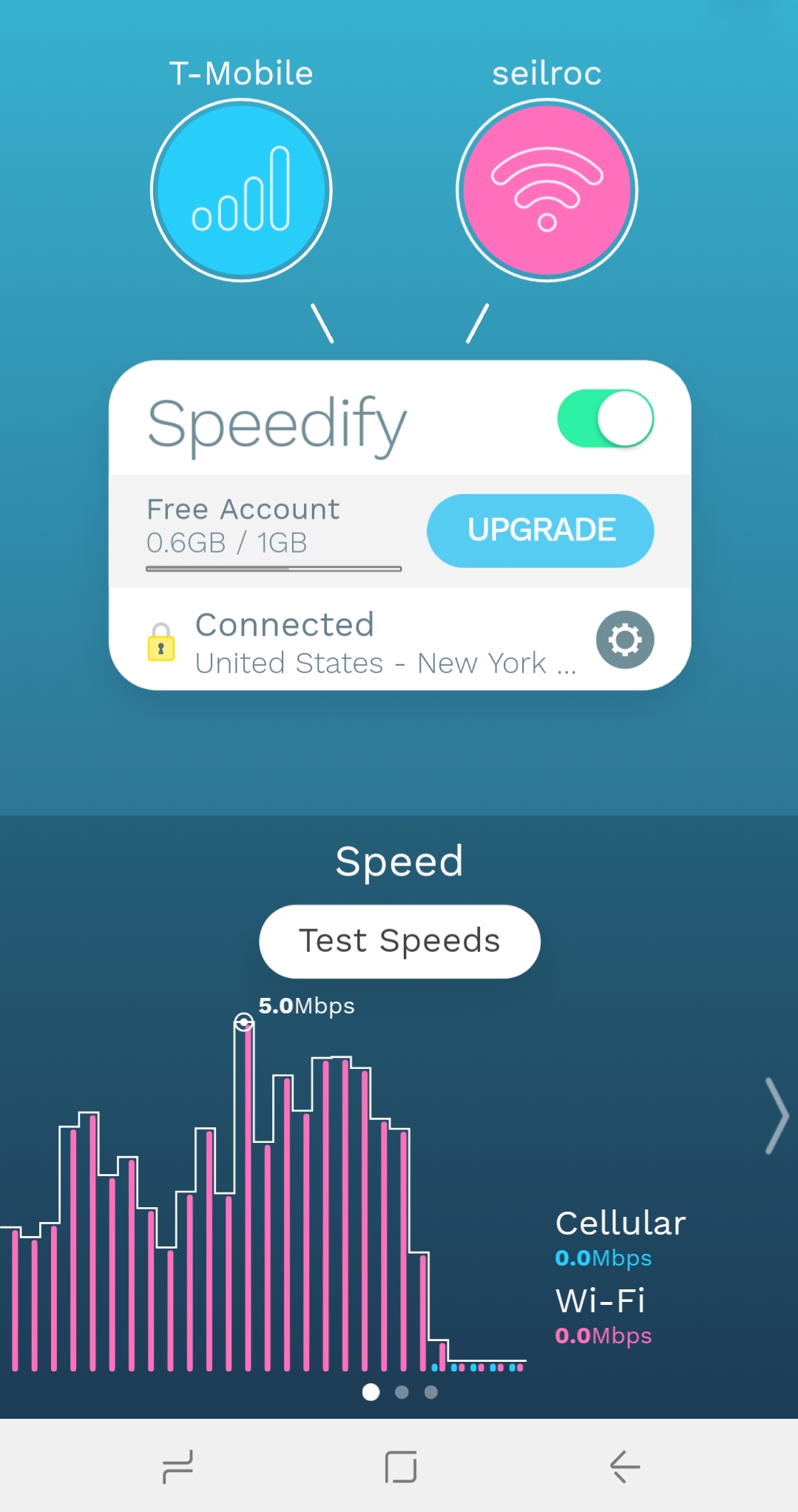
There are a couple of downsides to Speedify, whether free or paid. Its channel-merging magic doesn't work if there's only a single internet connection available. (If you're using both Wi-Fi and Ethernet at home, it's only one connection if both use the same modem.) And if you're regularly using cellular data along with Wi-Fi, you'll quickly eat into your carrier's monthly data allowance unless you've got an unlimited plan.
Performance
We tested Speedify along with eight other VPN services with free tiers: Avira Phantom VPN, Hide.me, Hotspot Shield, the Opera browser VPN, ProtonVPN, SurfEasy, TunnelBear and Windscribe.
Testing was done at a suburban New York home using a standard consumer cable-ISP connection. Connection time, network delay (latency), and upload and download speeds were measured using Ookla's Speedtest.net online service.
Each parameter was measured three times for each service. Because network speeds can vary, baselines without VPN connections were established before the start of each service's round of testing.
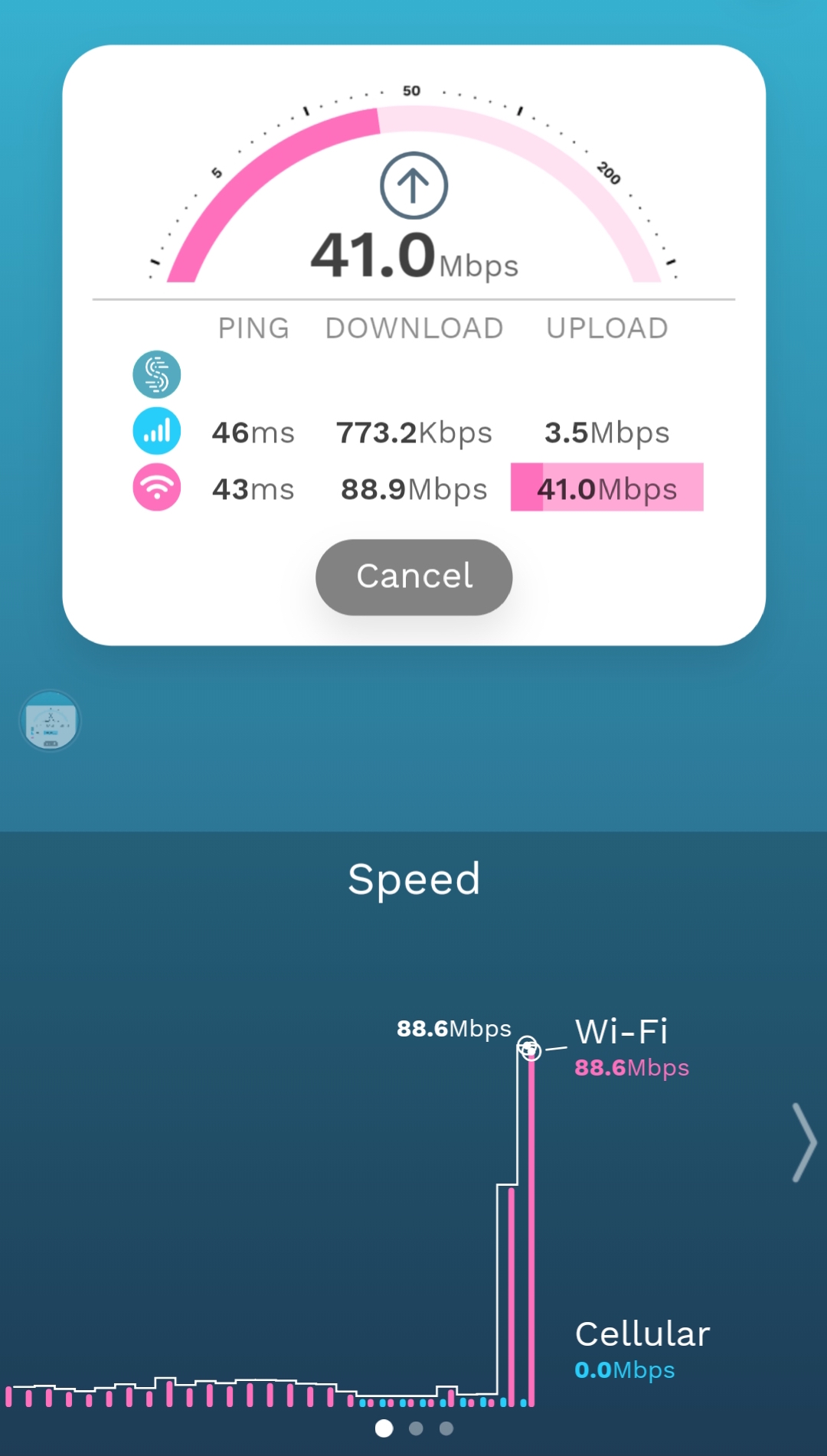
On a Samsung Galaxy Note 8 Android phone, it took about 3 minutes to download and install the 20MB app.
Because of this service's unique channel-bonding features, it wouldn't be fair to compare Speedify to other VPN services, except in terms of initial connection time. It sped up our broadband connections a lot, while normal VPN services slowed them down.
We used the Samsung Galaxy Note 8, instead of the Windows laptop we used to test other VPNs, to make sure we had the benefit of two internet connections. The baseline was established using the phone's regular T-Mobile LTE service.
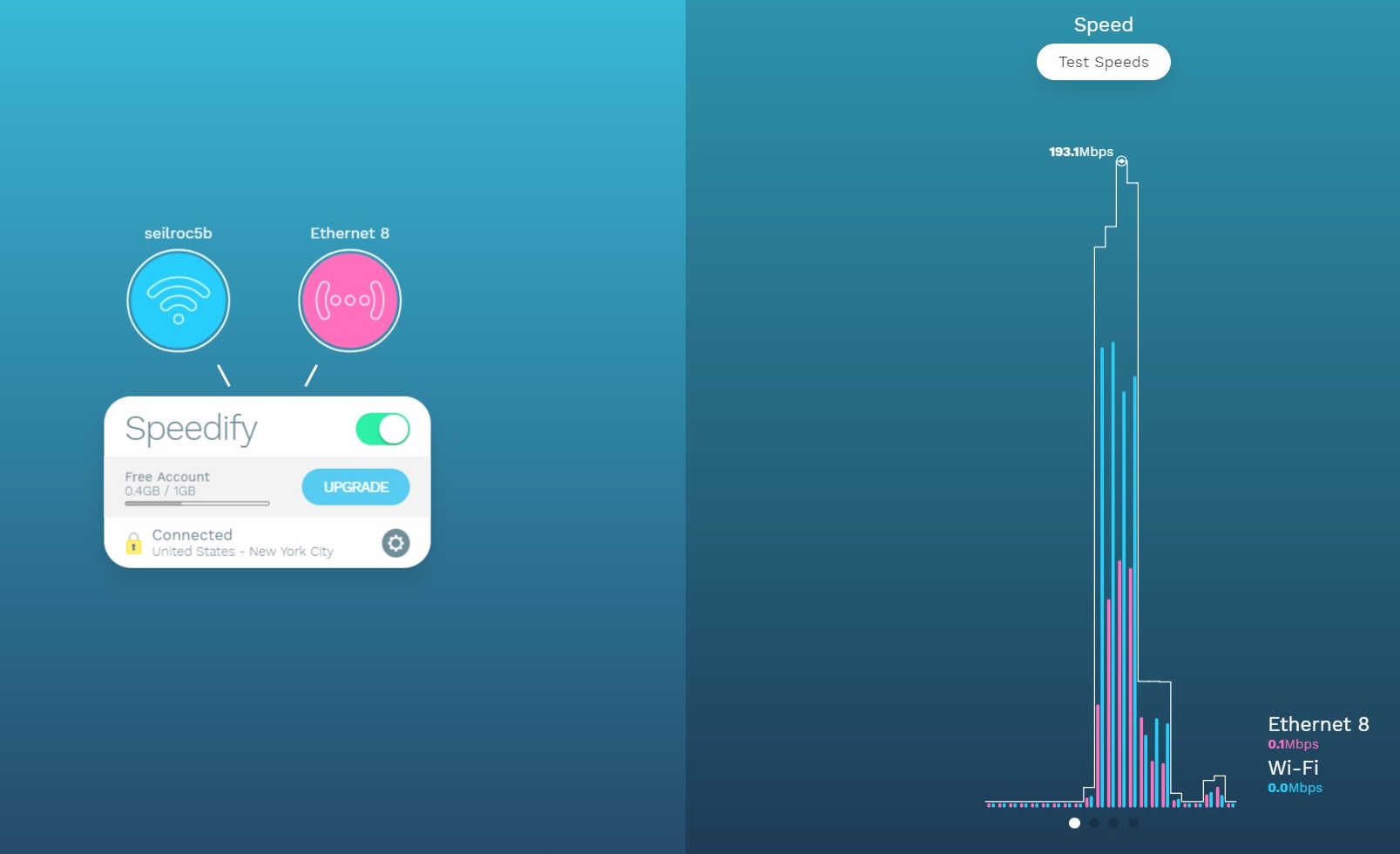
We connected to Speedify's New York servers in 2.4 seconds, a time bested by only Windscribe. Once it was switched on, Speedify boosted our phone's download speeds from 27.7 megabits per second (Mbps) with the phone in LTE mode to 74.2 Mbps, nearly three times as fast, when our home broadband connection was added.
MORE: Free vs. Paid VPNs: Which Should You Choose?
Upload speeds grew from 5.4 Mbps to 32.8 Mbps, a six-fold improvement. The phone's network latency dropped slightly, from 28 milliseconds to 23.2 ms; VPN services normally increase latency. Speedify would be an excellent service to use when watching videos or listening to music.
We didn't have a mobile data card, so we couldn't try out Speedify's channel-bonding on a computer. Combining our Ethernet and Wi-Fi connections, which led back to the same router, gave us pretty much the same results as with either the Wi-Fi or the Ethernet alone.
Bottom Line
There's no doubt that Speedify's channel-bonding technology is kind of amazing. We've never seen anything like it. When the service's free version was limited to 1GB a month, it wasn't terribly useful for much more than checking email and social media. Now that the cap has been raised to 5GB monthly, Speedify's free service is well worth it for travelers and casual VPN users.
Specs
Client platforms: Windows, Mac, Android, iOS
Protocols: SSL/TLS; ChaCha256
Servers/countries: 1,000/28 countries
Restriction: 1GB of data per month
Credit: Tom's Guide
Brian Nadel is a freelance writer and editor who specializes in technology reporting and reviewing. He works out of the suburban New York City area and has covered topics from nuclear power plants and Wi-Fi routers to cars and tablets. The former editor-in-chief of Mobile Computing and Communications, Nadel is the recipient of the TransPacific Writing Award.
-
chrismck "Needs at least two different internet connections" - I've been using Speedify for more than one year and it can work with just one connection as well, like a normal VPN. But you won't get the benefits of channel bonding.Reply
